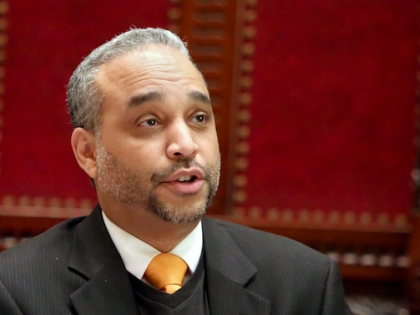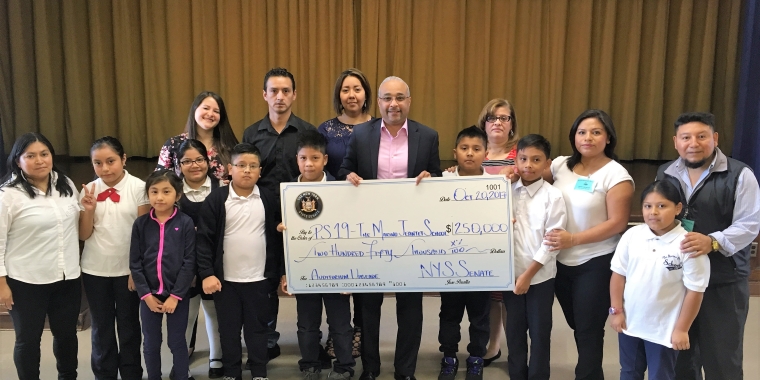
Peralta: 'It's Time to Stand Up to The NRA'
As reported by the Legislative Gazette:
The Republican-led State Senate should reconvene in Albany and pass gun control legislation, say a variety of New York City and state-level Democrats. Recent weeks have seen high profile shootings of Bronx children, coming with a concern that unacceptable gun violence has spread into formerly safe neighborhoods.
"Microstamping has the support of law enforcement and mayors throughout the state for good reason — because it would help put the most violent and dangerous criminals behind bars," said State Senator José Peralta, D-East Elmhurst, who sponsors the microstamping bill (S.675-c) currently stymied in the Senate. The legislation would require guns sold in New York state to incorporate tracing technology to label bullets as they are fired. Dealers ignoring the regulation could face three months to one year of incarceration.
Data from the Bureau of Alcohol, Tobacco, and Firearms suggests about a third of New York gun crimes are committed with weapons originating in New York state.
"Senate Republicans owe it to the countless victims of gun violence to pass this legislation as soon as possible," said Peralta. "It's time to stand up to the NRA." In a telephone interview last week, Peralta added: "The NRA is very concerned and very worried that if gun control passes here in New York, that other states will follow. They've invested a lot of time, energy, and money to try and block this legislation."
Peralta wants bipartisan gun legislation beyond simple microstamping, beginning with the passage of three "commonsense" bills he introduced. Bill S.670 would take guns away from people with serious psychological problems. "Even the NRA is in agreement with me on this one," he said. Bill S.725 would require that firearms licenses in New York be renewed every five years because "it gives the opportunity to give us a look at what's going on, like with driver's licenses," Peralta said. A just drafted bill would mandate a background check for purchasers of ammunition. "A red flag should go up if you order so much ammo," said the senator.
Microstamping legislation is sponsored by Michelle Schimel, D-Great Neck, and cosponsored by Naomi Rivera, D-Bronx, in the Assembly. The bill (A.1157-b) passed the Assembly in June by a vote of 85-60.
In light of recent gun violence in New York City, and the high-profile shooting by James Holmes in an Aurora, Col. movie theater, state lawmakers of all political stripes offered their views on microstamping and other gun control measures this week.
"Each and every morning, I'm sickened by the news of another mother, father, or child falling victim to gun violence," said Sen. Jeff Klein, D-Bronx. "New microstamping laws are an effective step we can take to keep guns out of criminal hands and out of our neighborhoods. I will do everything I can to see that microstamping legislation is adopted by the Senate. With the passage of microstamping, and other measures, I know that we can curb the alarming rise of gun violence in the Bronx, New York City, and the rest of our nation."
"The rise in gun violence in our communities over the last several weeks is totally unacceptable, and the State Legislature must move the microstamping legislation as soon as possible," said James Vacca, a New York City council member for Bronx.
State Republicans have argued in the past that microstamping would kill jobs, encourage companies like Remington Arms in Herkimer County to leave the state, and make owning a firearm more expensive, while having little effect on solving crimes, as the vast majority of criminal shootings are committed with a stolen weapon. Some of these arguments were reiterated and expanded by Assemblyman Robert Castelli, R-Golden's Bridge, who voted against microstamping in June.
Castelli, a former professor at the John Jay College of Criminal Justice and a 22-year veteran of the New York State Police, noted that the COBIS ballistics tracking system program, which required state officers to collect shell casings, was abandoned this year as a waste of money. Similarly, Castelli said "Microstamping is ineffective; it is a process that is easily defeated with the use of a file."
Castelli asserted that the police's role is fundamentally reactive — responding to crime, rather than proactive — attacking crime before it begins. He suggests looking to the social preceptors of crime, like high urban density and limited economic opportunity, might be the way to make real progress in reducing gun violence.
While Castelli thinks "mandatory sentencing for gun crimes and stronger sentences for the possession or use of illegal firearms" are examples of smarter lawmaking than microstamping, he added "we have some of the most restrictive firearms laws in the United States of America in the state of New York," and "a tougher gun law will not eliminate gun crime because the issues are mutually exclusive." He repeated a common mantra—enforcing the laws already on the books is more important than making new ones—and noted the circularity of the microstamping debate.
"Every year this comes up, every year this passes in one house, ever year this dies in the next house," said Castelli. "To every hammer, every problem is a nail, to every legislature, every problem is solved by a law."
Assemblywoman Teresa Sayward, R-Willsboro, a recreational shooter from the Adirondacks whose family explores American Indian heritage through hunting, voted nay on the June microstamping bill because she feels a common sense approach to gun control would be more effective. "As a gun owner, I have a responsibility to make sure that my guns are locked up, my ammunition is locked up ... taking people's rights away from them is not going to fix what's happening in America and what's happening in the world today."
A handful of Democrats also voted against the June microstamping bill when it passed the State Assembly. Robert Reilly, D-Latham, said: "In the most conceptual way ... I am for the right to bear arms, and I find that various legislators and other people try to take that away from us." Reilly noted his personal connection to the issue. "As a sportsman, I like to have my guns for hunting; I believe that microstamping is just a step for those people who would like to do away with all gun ownership in the U.S."
Reilly is empathetic to those plagued by gun violence in New York City, but also asserted microstamping's practical uselessness. "If I were a criminal with some degree of intelligence I would purposely leave a casing with somebody else's gun."
Assemblyman William Magee, D-Nelson, is more succinct. "A real criminal will find a way to remove [microstamping from a shell] so it couldn't be identified, and it's just putting another burden on legal gun owners."
Assemblywoman Rivera has trouble with these arguments. Noting that more than 270 Americans are killed or injured each day with a gun, she stands firmly with her allies. "That is why we are here today [July 27] to say to the Senate 'pass the bill and let's get as many guns off the streets as our laws will allow."
Rivera's Legislative Director Guillermo Martinez said microstamping would stand as a deterrent. Gun violence "statistics are overwhelming," and something must be done.
Senator Michael Gianaris, D-Astoria, feels he and his colleagues' push to get the Senate to reconvene for passing microstamping has a good chance of failure, but the greater point is to raise awareness about the usefulness of gun control.
"There's no argument for standing in the way of sensible gun laws, but unfortunately Senate Republicans are committed to the extreme right wing of their party." Gianaris went even stronger: "Senate Republicans make their decisions based on politics, not policy. Every law enforcement agency in the state would say that microstamping is a useful crime fighting tool."
New Yorkers Against Gun Violence say more than 80 police departments across New York state support microstamping legislation.
Peralta, who sits on the Crime Victims, Crime and Correction and the Mental Health and Development Disabilities committees has a simple response to those who argue microstamping would not be effective.
"If someone has a better idea about stopping violence on the New York City street, let's hear it," said Peralta. He cited a study asserting microstamping produced a workable code almost 60 percent of the time.
Peralta agrees with Gianaris that the State Senate will probably not reconvene for the sake of gun control, but hopes that the issue is high in the public consciousness the next time the Senate does get together. Noting the recent violence in the Bronx, a borough his district neighbors, Peralta argued "If these shootings were occurring in Long Island or in upstate, there would be an uproar on something to be done. We need to put politics aside, because this is a matter of life and death now."
"Microstamping will help identify the first purchaser of a gun and make shell casing identifiable," said Jackie Hilly, executive director of New Yorkers Against Gun Violence. "We call on the New York State Senate to enact this important legislation to help save lives."
"I make a plea to [Senate Majority Leader] Dean Skelos and [Deputy Majority Leader] Tom Libous," said Peralta. "If we're not going to have a special session on this, when we do come back, let's discuss gun measures, let's make it happen. Let's eliminate party lines right now. [Gun violence] is not just affecting New York City, it affects New York state. [Let's] bring up reasonable gun legislation so that we can debate it, discuss it. This is bigger than me, bigger than Democrats, bigger than Republicans. This is about saving lives."
For full articel clcik here.

